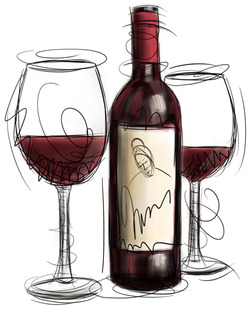 Red wine and resveratrol: Good for your heart?
Red wine and resveratrol: Good for your heart?
 Red wine and something in red wine called resveratrol might be heart healthy. Find out the facts, and hype, regarding red wine and its impact on your heart.
Red wine and something in red wine called resveratrol might be heart healthy. Find out the facts, and hype, regarding red wine and its impact on your heart.
Red wine, in moderation, has long been thought of as heart healthy. The alcohol and certain substances in red wine called antioxidants may help prevent heart disease by increasing levels of "good" cholesterol and protecting against artery damage.
While the news about red wine might sound great if you enjoy a glass of red wine with your evening meal, doctors are wary of encouraging anyone to start drinking alcohol. That's because too much alcohol can have many harmful effects on your body.
Still, many doctors agree that something in red wine appears to help your heart. It's possible that antioxidants, such as flavonoids or a substance called resveratrol, have heart-healthy benefits.
How is red wine heart healthy?
Red wine seems to have even more heart-healthy benefits than other types of alcohol, but it's possible that red wine isn't any better than beer, white wine or liquor for heart health. There's still no clear evidence that red wine is better than other forms of alcohol when it comes to possible heart-healthy benefits.
Antioxidants in red wine called polyphenols may help protect the lining of blood vessels in your heart. A polyphenol called resveratrol is one substance in red wine that's gotten attention.
Resveratrol in red wine
Resveratrol might be a key ingredient in red wine that helps prevent damage to blood vessels, reduces "bad" cholesterol and prevents blood clots.
Most research on resveratrol has been done on animals, not people. Research in mice given resveratrol suggests that the antioxidant might also help protect them from obesity and diabetes, both of which are strong risk factors for heart disease. However, those findings were reported only in mice, not in people. In addition, to get the same dose of resveratrol used in the mice studies, a person would have to drink over 60 liters of red wine every day.
Some research shows that resveratrol could be linked to a reduced risk of inflammation and blood clotting, both of which can lead to heart disease. More research is needed before it's known whether resveratrol was the cause for the reduced risk.